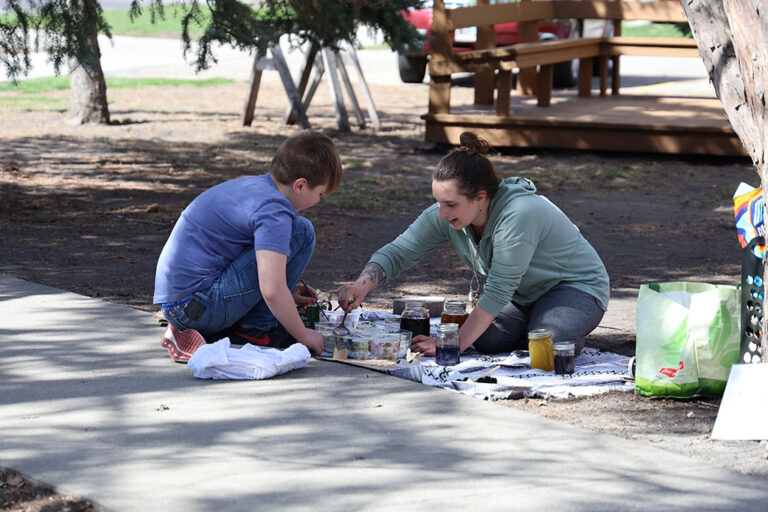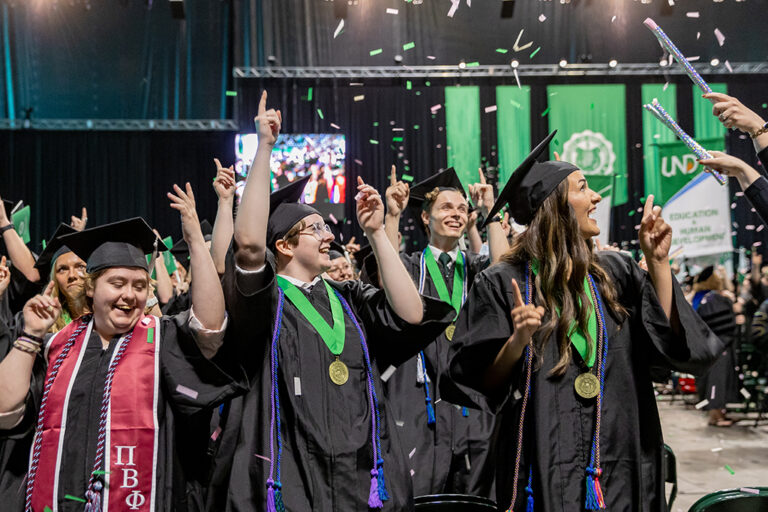Prized Phi Beta Kappa invites will hit mail in April
UND’s top liberal arts and sciences undergrads soon could join prestigious Phi Beta Kappa national honor society

How do you spell distinction and lifelong leadership in three letters or less?
* * *
If you’re a student at the University of North Dakota, you might have guessed an answer such as M.B.A. or B.B.A. — or maybe, M.D., J.D. or Ph.D.
Of course, those answers and any number of other academic acronyms would be correct. But Amanda Nagy, associate professor and director of German Studies and Global Studies at UND, says a small number of senior undergraduates soon will get the chance to spell success with three other important letters.

And those would be the Greek letters ΦBK — otherwise known as Phi Beta Kappa — the prestigious American academic honor society that originated in 1776 and counts among its notable alumni 17 U.S. presidents, 42 Supreme Court justices and more than 250 Nobel laureates.
The organization honors only the best and brightest liberal arts and sciences undergrads from 293 top schools across the nation. That’s about 10 percent of U.S. colleges and universities, and the students themselves are chosen through a highly selective, merit-based invitation process.
Nagy is a member herself, and at UND, she is the PBK secretary and part of the committee that evaluates at least 50 academic transcripts each semester to determine who might get that rare invite. Besides maintaining a stellar GPA, the students must demonstrate their potential by taking a wide variety of courses in liberal arts and sciences.
“It’s usually just the top 10 percent of the class — and sometimes fewer — who get invited,” Nagy said. And the selection rate is the same nationwide. “Being a member of Phi Beta Kappa is really special. It sends a message that you’re an active learner who values education and critical thinking. These students are not just checking the boxes for Essential Studies.
“These are students who recognize that stepping outside the basic requirements will lead them to be more successful, more well-rounded and greater contributors to their communities.”
It’s a distinction worthy of your resume and far beyond, she added, because professionals nationwide recognize the great achievement.
A little history
It was five students at the College of William & Mary in Williamsburg, Va., who founded Phi Beta Kappa during the American Revolution to advance their motto, “Love of learning is the guide to life.”
According to the organization’s website, “A new nation would require institutions — cultural as well as political — as a grounding force and elevating influence in turbulent times.”
Over roughly the next 250 years, the once-secret society that debated many controversial topics of the times evolved alongside higher education to become an organization that now “attests to the lifelong value of an education that fosters scientific inquiry, liberty of conscience, critical thinking and creative endeavor for all.”
Bradley Rundquist, dean of UND’s College of Arts & Sciences, points out that the University is proud to have had the only Phi Beta Kappa chapter in the state since 1913. Efforts to establish that chapter began as early as 1907, and no doubt, everyone on campus will recognize some of the names of those charter members. Among them are George Abbott, William Bek, Melvin Brannon, Arthur Leonard, Frank McVey and Vernon Squires.
“As the steward and heart of comprehensive educational experiences here at UND, the College of Arts & Sciences is committed to the ideals of Phi Beta Kappa and to the importance of lifelong learning, exploration and discovery,” Rundquist said. “We are grateful to have faculty who ensure the chapter’s longevity and legacy. And we’re proud to help nominate students to join this esteemed society.”
UND Provost Eric Link added: “We are incredibly proud of these students and what they have accomplished. Being a member of Phi Beta Kappa signifies that these students have excelled not just academically, but that they’ve also displayed an intellectual curiosity, embraced the love of discovery and shown a commitment to leadership and service.
“These are core tenets of a liberal arts education and closely align with the mission and vision of the University of North Dakota.”
Signs of a bright future
One of UND’s earliest PBK inductees was Pearl Young, who graduated in 1919 with a triple major in Physics, Mathematics and Chemistry. While at the University, Young served as a laboratory assistant in the Physics Department and also for the U.S. Weather Bureau.
After graduation, she taught physics for two years before accepting an appointment at the Langley Memorial Aeronautical Laboratory in Hampton, Va. She was the first woman hired as a technical employee, a physicist of the National Advisory Committee for Aeronautics, or NACA — the agency that later became NASA. Young also was the second woman hired as a physicist by the federal government.
Today, there are 500,000-plus living Phi Beta Kappa members nationwide, comprising a diverse network of high achievers who continue to advocate for the importance of a liberal arts and sciences education. Countless members have gone on to achieve great things in their lifetimes.
And perhaps UND’s Andrew Simons of Coon Rapids, Minn., will be the next one to do so. Simons, a double major in Chemistry (American Chemical Society-certified) and Secondary Education, was inducted with the most recent PBK class in December.
“I feel very honored to be inducted into the UND chapter of Phi Beta Kappa, and it feels like a culminating capstone to my undergraduate experience,” Simons said. “The PBK motto really speaks to me as a prospective educator. I fell in love with school many years ago, and I love trying different classes and learning new things.
“I think it is every teacher’s dream to be able to inspire their students to both love learning and to find joy and fulfillment in expanding their horizons. New ideas and new experiences keep life interesting, and continual learning helps you grow as a person.”
Other UND students inducted into PBK in December were Jace Catalan, Kasey Cwikla, Evan Halvorson, Aubrey Meehan, Ranjana Mosby, John Paul Sanden, Abigail Triplett, Lauren Van Winkle, Ethan Simons, Kayla Bornemann and Reeve Froseth.
Nagy says paper invitations for the next UND cohort of PBK candidates will go out next month. Students should keep an eye on their postal mail for a formal letter and invitation from the dean’s office and also for a follow-up email. Half of the $95 lifetime membership is paid for by the Dean’s Office in the College of Arts & Sciences, and Pell-eligible students pay nothing.
>> LEARN MORE about Phi Beta Kappa on the UND website and at the national website for Phi Beta Kappa.



